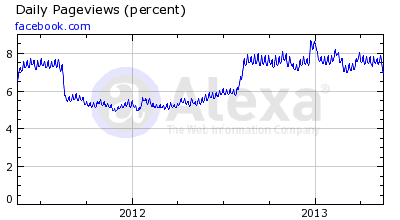The tech press (especially the Guardian in the UK) has been running wild over the story that Facebook is losing users hand over fist.
The initial report was carried out by SocialBakers over a three month time frame and was given a lot of coverage on the Guardian web site. The Guardian, in fact, introduces additional analysis such as stating that along with the amount of users being in decline, time spent on site dropped by 6 minutes. They cite boredom as one of the main reasons, stating users are looking for something new such as Path or Instagram (which is owned by Facebook anyway).
Here are 5 reasons why you shouldn’t read too much into this just yet.
1. Mobile
The initial report was based on figures that were misinterpreted, only taking into account desktop users. Mobile visitors surpassed desktop towards the end of last year and account for over a quarter of Facebook’s ad revenue. If mobile or app traffic has not been taken into account then that is a pretty large segment to omit.
2. Advertising Revenue
Facebook’s advertising revenue is booming, setting new records in the first quarter of 2013 . I do not believe that advertisers would invest so much in Facebook if they didn’t think they would get a good return.
3. Trends
Trending data and comparisons with previous years would be interesting to see. I’m aware that this may be a bit difficult to calculate given the rapid growth in users but it’s not impossible. Maybe the beginning of the year is a quieter time generally?
From the illustration taken from Alexa.com you can see that there are more page views than the corresponding year. I know this is not the most accurate representation but it does give some indication of traffic. The graph shows that approximately 7.5% off internet traffic is on Facebook.
4. Scale
Facebook is the size of India. While the drop could be seen by some as alarming, it is a small percentage of the “population” overall. In fact reports indicate that penetration has peaked in developed countries while still being on the rise in emerging markets.
5. Wrong conclusions
SocialBakers have themselves said that the Guardian article has misinterpreted the report.
Sometimes, journalists get stats wrong. The Facebook stats found on our page are not primarily intended for journalists, but rather Ad estimates for marketers.
The site lists some UK facts and figures and claim that there is no story in their findings.
So were you worried about the report or is it just business as usual?





